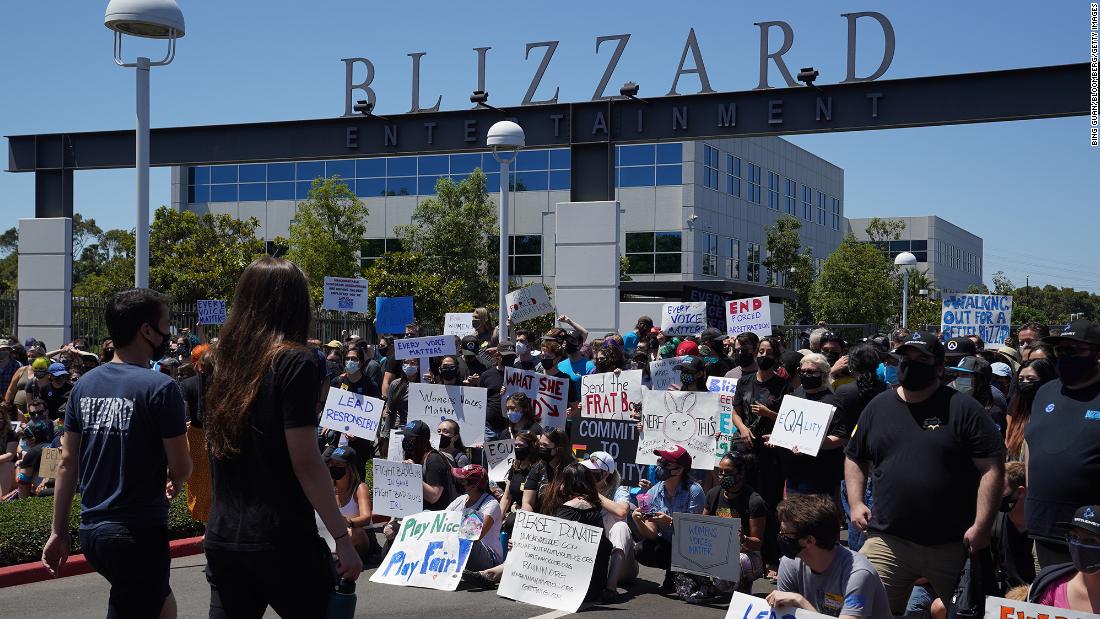Activision Blizzard lawsuit could be a watershed moment for the business world. Here’s why

The unfolding crisis, and the response to it from employees, echoes similar controversies at major tech firms. And the fallout from what happens at Activision Blizzard is likely to have major ripple effects not only across the gaming world but also the tech industry and corporate America at large.
The lawsuit alleged a “frat boy” work culture where multiple female employees were subjected to gender discrimination, sexual harassment, and unequal pay, and that “the company’s executives and human resources personnel knew of the harassment and failed to take reasonable steps to prevent the unlawful conduct, and instead retaliated against women who complained.”
But that didn’t stop dozens of employees from staging a walkout at the company’s campus in Irvine, California (with hundreds more joining virtually) on Wednesday. Some of the demands included greater pay transparency and an end to mandatory arbitration.
A watershed moment
It sets up a standoff between Kotick, an industry veteran who became CEO of Activision in 1991, and his employees. And that could end up being a watershed moment not just for Activision Blizzard, but for the gaming and tech industries at large, both of which have faced accusations of sexism, racism and a broader lack of diversity for years.
“We know that gaming is a little bit less diverse than even some other aspects of the technology industry, and that there is a bro culture there,” said Y-Vonne Hutchinson, founder of inclusion consultancy firm ReadySet and author of the upcoming book “How to Talk to Your Boss About Race.”
Game development, which involves long hours and even overnight marathons for days at a time, creates “this unhealthy working culture generally, and one that … relies on the person’s love of gaming, as opposed to compensation, to get people to do these things,” she added. “And then you compound it with the bro culture that you often do see in gaming, and in particular, certain kinds of gaming companies.”
Spurred on by the California lawsuit and its aftermath, several employees across the gaming industry are now speaking out about sexual harassment, pay disparities and other aspects of the culture. All eyes will now be on how Activision Blizzard’s leadership handles the situation and whether it faces more consequences or changes beyond the Tuesday announcement of Brack’s departure.
Laws against sexual harassment and discrimination have “finally become more and more empowered and enforced,” said Walter Foster, a labor and employment lawyer at the firm Eckert Seamans Cherin & Mellott in Boston who previously worked in the Massachusetts state attorney general’s office.
“The allegations brought by the California state department [are] seminal, and probably bellwether type litigation for this industry,” he said. “It’s being brought by a state agency, so they have the resources of the state. They don’t invest in those litigations until they know they have a good case. … You take a case to make an example.”
(ATVI) employees are already pushing back against Kotick for not including them in the process of selecting the third party auditing their company culture.
“Too often, investigations go awry. Victims are silenced and the bad behavior continues,” said Melanie Leslie, dean of the Cardozo School of Law at Yeshiva University. Companies often use investigations to gather ammunition to defend against lawsuits or to “whitewash the scandal” in the public forum, she added. Even well-intentioned investigations can struggle to get at the truth because employees may be afraid to be candid with company-appointed lawyers.
“Most important, internal investigations do little to get at the real problem — the need to change a particular corporate culture,” Leslie said. “What’s really needed is effective ethical leadership.”
What’s next for Activision?
So far, in Activision Blizzard’s case, there has been no explicit demand for the common next step in corporate scandals: the resignation of the CEO. Workers participating in the walkout have said they want to work with the leadership team on their demands.
“We expect a prompt response and a commitment to action from leadership … and look forward to maintaining a constructive dialogue on how to build a better Activision Blizzard for all employees,” the walkout participants said in a statement responding to Kotick’s letter that was seen by CNN Business.
Activision Blizzard’s board on Monday expressed its support for Kotick.
“First and foremost, the Board recognizes and thanks all those who have bravely come forward. There is no place for discrimination, harassment, or unequal treatment at Activision Blizzard or anywhere,” Brian Kelly, the board’s chairman, and Robert Morgado, its lead independent director, said in a statement to CNN Business.
“We have complete confidence in Bobby’s leadership. He has successfully led the company for over three decades in a rapidly evolving industry while increasing the value of the company by tens of billions, and has been unwavering in his commitment to create a supportive and respectful culture,” they added. “He understands that the talent at Activision Blizzard is the lifeblood of the company and it’s essential to have a safe, diverse, and inclusive workplace. We are working with him and his leadership team to ensure that action is taken as we move forward and look toward the future.”
But Hutchinson said, based on her work on diversity and inclusion in the tech industry, that when scandals like this happen an overhaul at the top may ultimately be necessary to truly fix the problem.
“An investigation is not going to substitute for the need to change leadership,” she said. “The message that it sends if you run an investigation and everybody still stays there is that actually it’s okay. So I think they’re going to have to clean house.”
For now, the biggest change is at the Blizzard division, with Brack out. Brack will be replaced by Blizzard executives Jen Oneal and Mike Ybarrra, who will co-lead the division. While the company did not detail a reason for his exit, Brack said in a statement: “I am confident that Jen Oneal and Mike Ybarra will provide the leadership Blizzard needs to realize its full potential and will accelerate the pace of change.”
However the situation shakes out, Activision Blizzard’s leadership will find the enormous public pressure — in addition to the pressure from California’s investigation itself — impossible to ignore or brush off. And much of that comes down to how empowered employees feel to voice their opinions and their discontent.
“We are living in the middle of the great resignation, where a lot of people are looking at their workplaces and saying this no longer serves me,” Hutchinson said. “And I think that part of that reflection and that walking away is going to have to do with these toxic bro cultures that hurt everyone.”
— CNN Business’ Clare Duffy contributed reporting.








